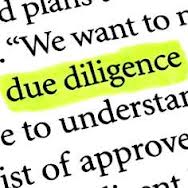Vendor/Supplier Due Diligence: Tricky Issues and Twists and Turns
 You have to admire chief compliance officers for their tenacity and ability to multi-task. They are the consummate jugglers of important projects, strategies and tasks. They can never completely finish their tasks – when one is finished, the list continues to grow with more to dos.
You have to admire chief compliance officers for their tenacity and ability to multi-task. They are the consummate jugglers of important projects, strategies and tasks. They can never completely finish their tasks – when one is finished, the list continues to grow with more to dos.
Over the last few years, companies have paid more attention to third-party due diligence. As a result, companies have built effective policies and procedures to screen new third parties and add in required contractual protections to minimize risk.
Companies are now focusing on two related areas – first, monitoring of third parties and second, vendor risk management. Building a due diligence program for vendors/suppliers is not as easy as everyone thinks. CCOs know this and are familiar with the practical issues.
Here is a step-by-step outline of the process which needs to occur. This is only a basic outline and there are many twists and turns which can develop based on specific circumstances.
Step 1 – Relationship with Procurement/Vendor Management. The CCO needs to develop a working relationship with the vendor management/procurement function in the company. Nothing will happen unless these two managers agree to coordinate and work together.
Step 2 – Coordination of Functions. Vendor managers are required to build internal systems to screen potential vendors/suppliers for financial qualifications, quality, reliability and other important functions needed by the company. In many cases, the procurement side of the business has established procedures for questionnaires on financial issues and other screening considerations. Anti-bribery issues can be built into this process as a cost-cutting short-cut for the review and screening of vendors/suppliers.
Step 3 – Ranking of Vendors/Suppliers. The list of vendor/suppliers is usually very long given the number of items needed by a company to run its business. Some items directly relate to the goods and services provided by the company. And some are needed to support the company’s operations. A system for ranking vendor/suppliers needs to be developed to focus the due diligence process based on corruption risk.
At the outset, there is an important legal issue which needs to be defined. Not all vendor/suppliers fall under corruption scrutiny. The tricky issue is to define those vendors/suppliers that can create FCPA liability for your company. What do I mean by that?
Supplier A provides an important item needed by Company X to produce a product. Supplier A has to secure an import license on Company X’s behalf to import the item into the country for delivery to Company X. In securing this import license from the foreign government on Company X’s behalf, Supplier A can pay a bribe to the foreign official on Company X’s behalf to deliver the item. As a result, Company X needs to subject Supplier A to FCPA due diligence.
In the alternative, Supplier B delivers sodas to Company Y’s facility for its employees at a facility in a foreign country. Supplier B delivers sodas to over 50 companies in the foreign country. Supplier B has to import the sodas but does not do so on Company Y’s behalf (since the sodas are fungible for each company which receives the sodas). Company Y does not need to conduct due diligence for any legal liability under the FCPA. However, Company Y may conduct due diligence if it decides that there is reputational risk as a result of its dealings with Supplier B.
 Under these alternative scenarios, companies need to focus their due diligence efforts on vendors/suppliers by dividing its suppliers/vendors between these two categories. Once the list is divided into the legal liability and non-legal liability category, further ranking can be applied depending on the usual factors – country of operation, amount of money involved, nature and extent of foreign government interactions, length of relationship between company and vendor/supplier.
Under these alternative scenarios, companies need to focus their due diligence efforts on vendors/suppliers by dividing its suppliers/vendors between these two categories. Once the list is divided into the legal liability and non-legal liability category, further ranking can be applied depending on the usual factors – country of operation, amount of money involved, nature and extent of foreign government interactions, length of relationship between company and vendor/supplier.
These are only the basic issues which need to be examined. As usual when dealing with due diligence issues, there are a number of factors which can arise which are hard to predict in advance.
















1 Response
[…] Volkov discusses vendor and supplier risk. Tom Fox continues a series on supply chain risk. The FCPAProfessor runs […]